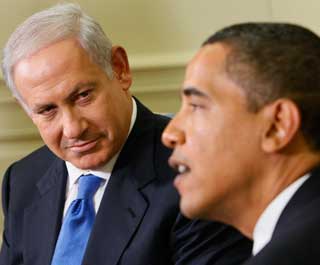By Jonathan Tobin
 | |
|
| |
The final polls before Israel's election were published Friday and the results will provide little comfort to Benjamin Netanyahu's many critics in the United States. All the surveys of opinion before tomorrow's vote point in one direction: Netanyahu will win. Even the most pessimistic estimates of his party's vote shows the Likud getting approximately twice as many seats in the next Knesset as the next largest competitor and the parties that make up Netanyahu's current coalition will gain a decisive majority. Netanyahu will be in charge of a comfortable majority that is, if anything, more right-wing than the government he led for the past four years.
That's a bitter pill for an Obama administration that believes, as the Atlantic's Jeffrey Goldberg reported earlier last week, that the president knows what is in Israel's "best interests" better than Netanyahu and which spent much of its time in office battling him. It makes sense to think the two leaders will continue to distrust each other and to quarrel over the peace process and how to deal with the Iranian nuclear threat.
The rightward tilt of the next Netanyahu government and what appears to be the aggressive and confident tone of the second Obama administration in which the president appears to be surrounding himself with people who agree with him rather than centrists or those who have different perspectives both seem to argue for more rather than less conflict between Washington and Jerusalem.
But the doom and gloom scenarios about four more years of this tandem may be exaggerated. There are three good reasons that may serve to keep tensions from boiling over.
The first factor that may keep the conflict in check is something that the controversial Goldberg column made clear: the president may have learned his lesson about the peace process. Though Goldberg and the president both wrongly assume that Arab "moderates" want peace and need to be encouraged with "conciliatory gestures," the writer notes that Obama understands that Palestinian Authority leader Mahmoud Abbas is weak. He also knows that every attempt by the administration to pressure Netanyahu and to tilt the diplomatic playing field in the Palestinians' direction on settlements, Jerusalem and border, was met with disinterest by the PA.
Nothing Obama could do or say, no matter how damaging to Israel's cause was enough to tempt Abbas back to the negotiating table. Indeed, the Palestinians' decision to go to the United Nations to get recognition was not so much aimed at Israel, as it was an end run around the Obama administration.
Continue reading.
No comments:
Post a Comment